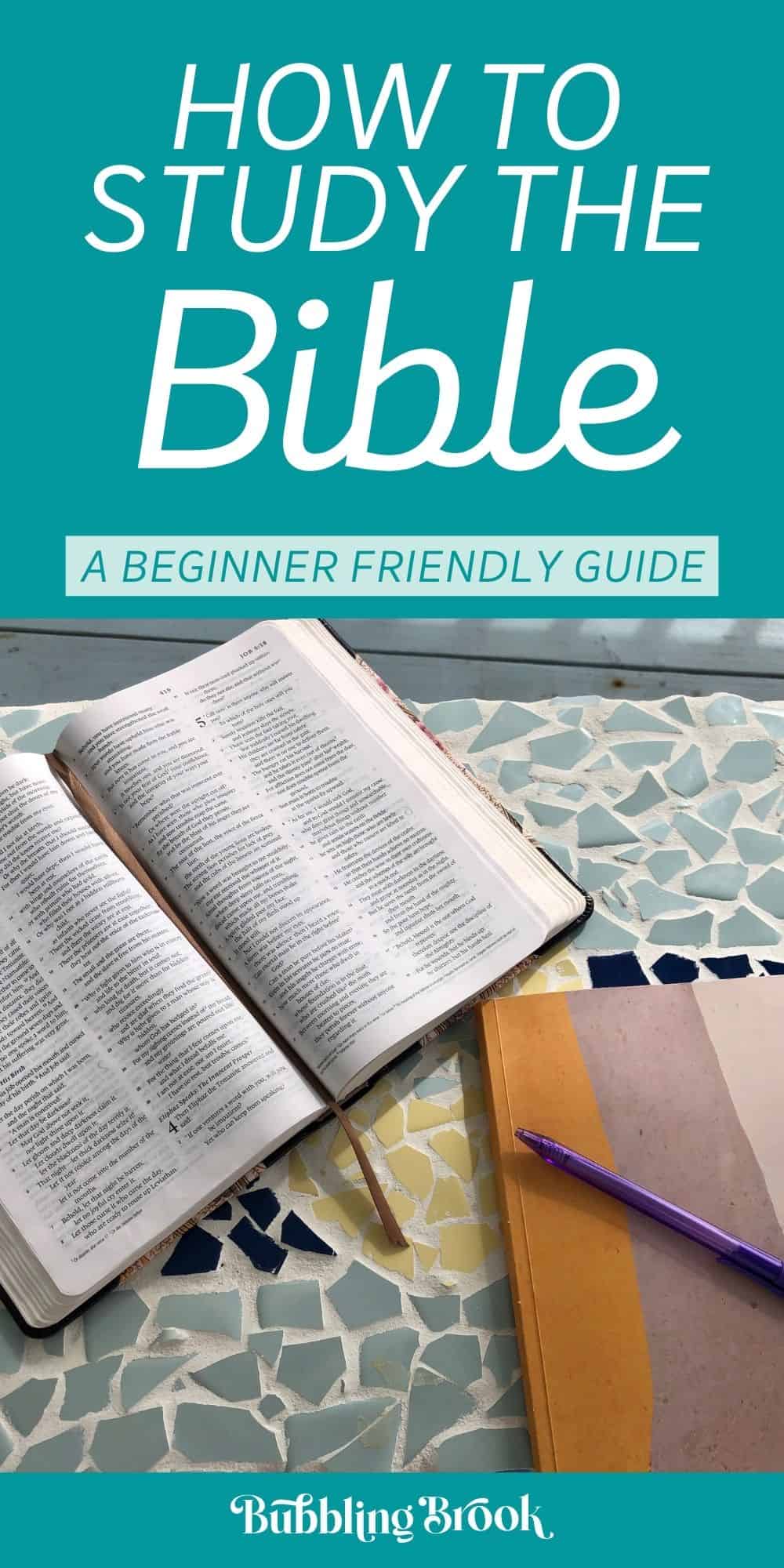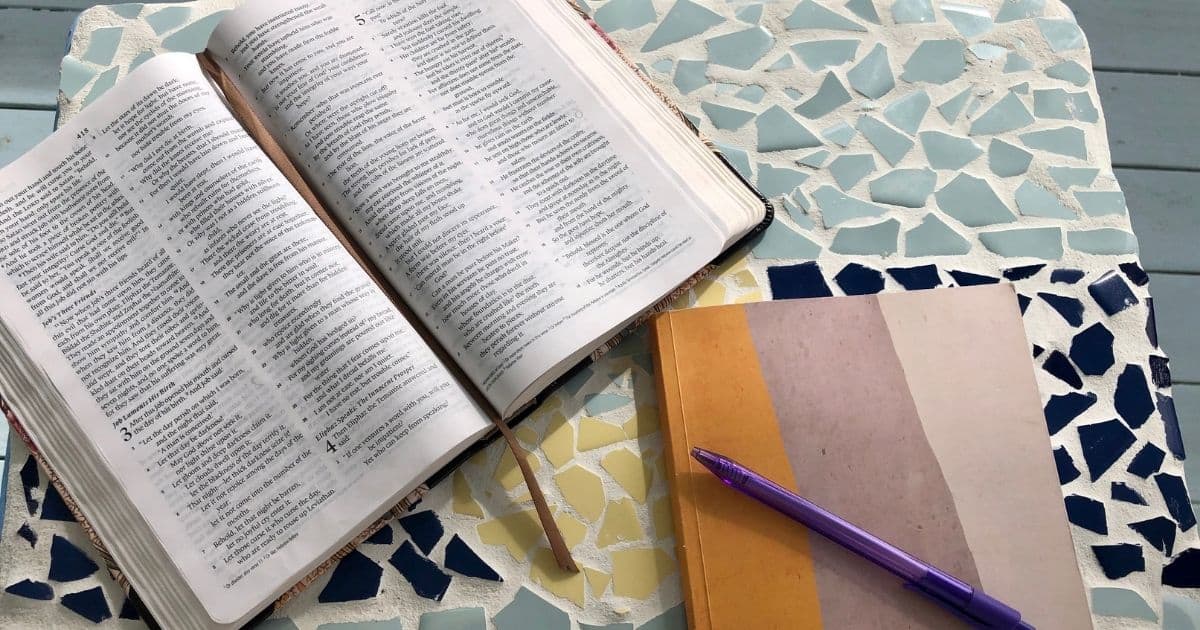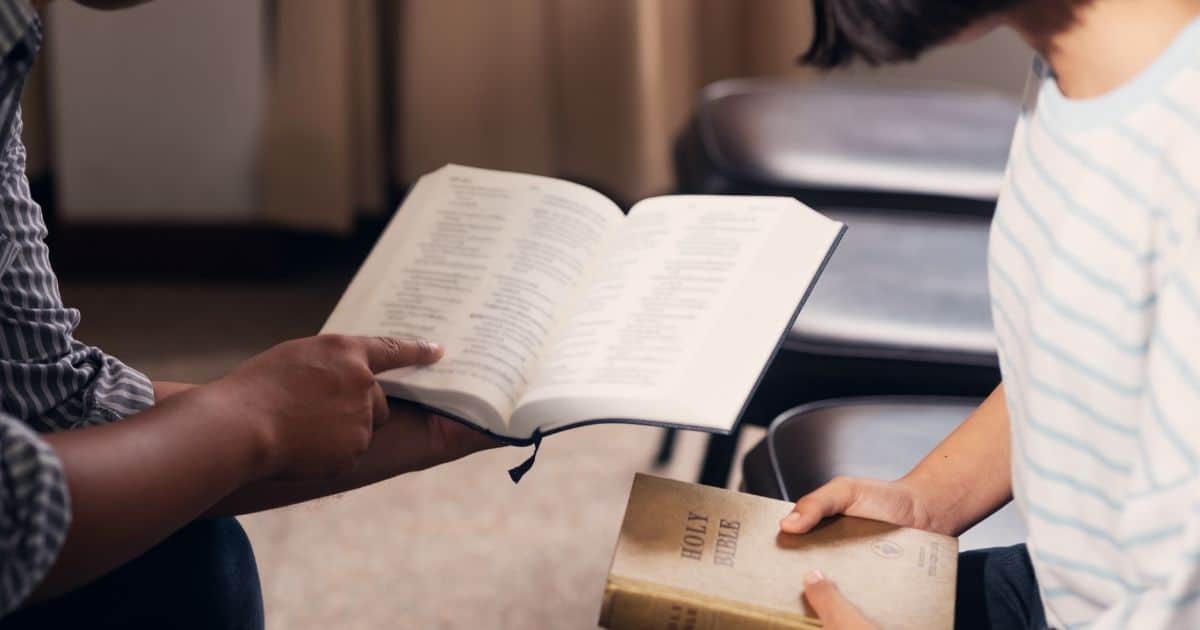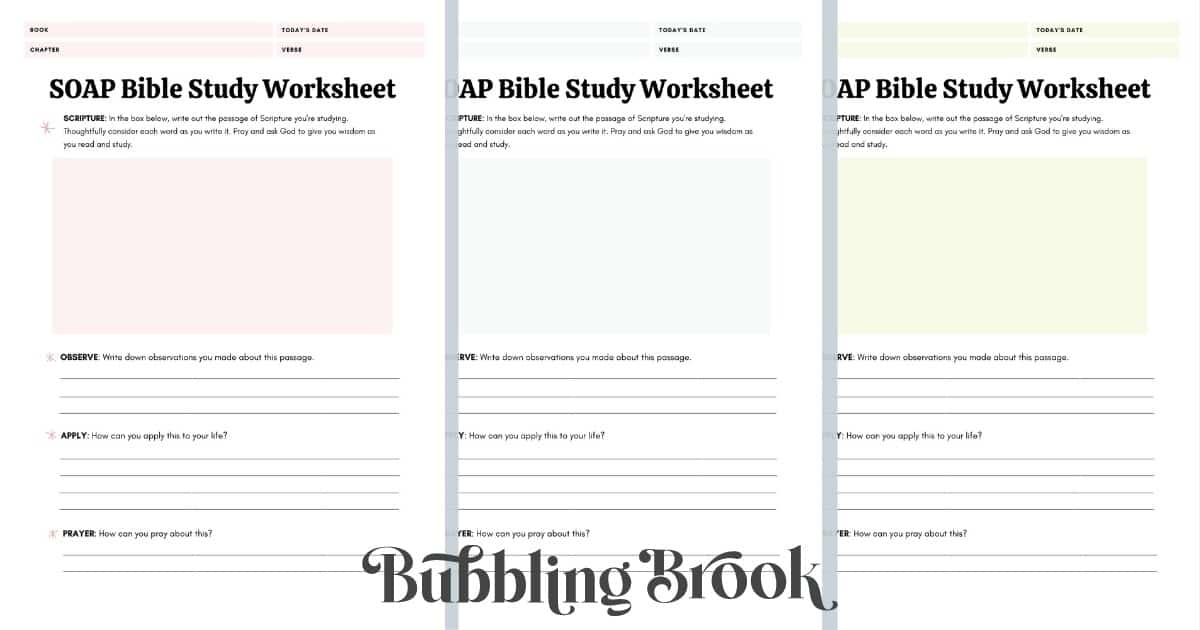Grow closer to God and deepen your faith as you learn how to study the Bible for beginners. We’ll show you how to get started in this handy guide to studying the Bible!
If you’ve wondered how to start studying the Bible when you’re a beginner or new believer just starting out, then you should know: I’ve been there, too, despite having grown up sitting on a church pew.
Sure, I knew a few feel-good Bible stories, and had memorized a handful of popular bible verses over my childhood, but it wasn’t until I was an adult that I began to really dive into God’s Word. Did you know, it’s possible to know Bible stories, yet totally miss the Bible story? Many of us who grew up in church experience this, not just newcomers. If this sounds like you, you’re not alone. Keep reading, because I’m going to break down (in a simple but comprehensive way) how to study the Bible for beginners.
Related: Best Study Bibles For Women
When we pastored, I saw this same dilemma among the precious people there. Whether you’d grown up in church all your life or were totally new to Christ, over time you came to the realization that you needed to enrich your understanding of the Bible and get rooted in your faith.
Over the past 20+ years, the Holy Spirit has used the Scriptures to change my understanding of who God is, what he likes and dislikes, and more. This powerful, living word has changed my marriage, parenting, finances… everything. Isn’t that what it’s all about? After all, in the words of Dr. Howard Hendricks, “The Bible was written not to be studied but to change our lives.” Studying God’s Word should produce life transformation (see Romans 12:2).

Disclosure: This post contains affiliate links to items I think may be helpful to you.
How to Study the Bible For Beginners
Digging into the Word of God can seem intimidating at first, but we’re here to help you begin, without getting overwhelmed. Let’s get started!
Table of Contents
3 Reasons to Study the Bible (Or, What’s Your Why?)
Why do you want to study the Bible? Pause and consider this. God is drawing you in, prompting you to grow closer to Him. Having some concrete reasons and understanding why this is important to you will help you stay motivated to study long after the initial inspiration has passed. Here are three solid reasons to begin studying the Bible:
To gain insight on who God is. Theologians have described the Bible as God’s love letter to us. It teaches us his likes, dislikes, and about his character. The Bible is a book about God, and it reveals to us a little bit about who God is on every page. How can we truly know him if we don’t intently study his word?
To receive wisdom and instruction. The Bible teaches us so much, and studying it helps us grow in wisdom. For example, in the Old Testament, the book of Proverbs is filled with instruction and principles for how best to live our life here on earth. We also find needful insight in the gospels and letters to the New Testament churches. 2 Timothy 3:16 tells us, “All Scripture is breathed out by God and profitable for teaching, for reproof, for correction, and for training in righteousness.”
Because if we aren’t moving towards God, we drift away from him. When we aren’t actively pursuing our relationship with God, we tend to drift away from him. It’s human nature. We’re told to “hunger and thirst after righteousness” (Matthew 5:6) and to “study to show thyself approved unto God […] rightly dividing the word of truth” (2 Timothy 2:15). This requires action on our part. Bible study is essential to spiritual maturity.
Related: How Do I Get Closer to God?

What is the Best Translation for Beginners?
Many people wonder what version of the Bible a beginner should use, and here’s my short answer: The best Bible translation for you is the one you’ll actually use.
For example, I could tell you that many people insist on only using the KJV, but if the KJV seems like a foreign language to you (it’s written in Old English style, with lots of “thees” and “thous”), then you probably won’t stick with studying it.
There are many solid english translations to choose from. A good starting point for some beginners is the NIV, since it’s fairly easy to read and uses more modern words we tend to use in our everyday life. You may also want to consider an ESV (this is my current favorite) which is a more literal translation. The more literal the translation, the better option it is for studying.
When my husband first began studying his many Bible years ago, he loved the Amplified Bible, which adds synonyms [in brackets like this] to help you understand the meaning of certain words as you read. Today, he finds the NASB to be his version of choice. Truly, choose the one that suits your current reading style and aligns closely with your comprehension level.
I do have one caution to make here: Some people use The Message as their Bible of choice. Note that The Message is not necessarily a version of the Bible, but rather a paraphrase of it. While it might be sufficient for casual reading, I personally don’t recommend using it for focused Bible study.

Where to Start When Studying the Bible for the First Time
It can be hard to know where to start reading the Bible. If you’re struggling with the best order to study the Bible, or where to begin, the book of the Bible I recommend starting with is John. It’s one of the Gospels in the New Testament and a great place to begin. When you’re new to studying the Bible or are somewhat unfamiliar with reading the Bible, you’ll get a lot out of John because he covers the entire life and ministry of Jesus. He was one of Jesus’s twelve disciples, and he witnessed many of Jesus’s miracles firsthand. It gives you a powerful glimpse into the life, works, and character of Jesus Christ.
As you become more seasoned with Bible study, don’t be intimidated to try more difficult books, even if they don’t seem very interesting at first. There are different ways to study, and many of them are fruitful. Be cautious about allowing your heart to guide what you study. We need to also work through books like Leviticus and Numbers; just save them for later, when you’re a bit more comfortable with knowing how to study the Bible.
Bible Study Methods When You’re Just Starting Out
When you’re just beginning to read the Bible, pick one method and stick with it for a bit. Don’t get overwhelmed by all the different study methods out there! Try out a few and see what feels most natural for your learning style. I often rotate between methods, depending on a variety of factors, such as how much time I have, whether I’m doing the study alone or with others, etc.
Let’s look at some popular Bible study methods for beginners.
Study by Using the SOAP Method
SOAP is an acronym to help you remember, and it stands for Scripture, Observation, Application, and Prayer.
First, you choose the scripture you want to study, then write it out in a notebook. Read through it several times. Second, make as many observations as you can about the passage. Think about the “who/what/when/where/why” of the passage, and write them down. What does it mean? Third, based on your observations, ask yourself what you’ve learned from those observations and how they can apply to your life. Finally, pause and pray (or write out a short prayer) about what you’ve learned.
If you’d like to try this simple way to study the Bible (and grab a free printable worksheet for it), check out my post about how to use the SOAP Bible study method.
Read Through One Book at a Time
With this method, you simply work through one book at a time, instead of skipping around through the entire Bible. This helps you fully grasp the meaning of the book overall and how each chapter relates its message. This should be one of your go-to methods of Bible study. If all of your studies bounce from passage to passage, you only gain fragments of Bible knowledge and never a sense of the whole. When you do a whole book from beginning to end, you learn about Bible topics as they arise in your reading, gain a better understanding of cultural context, and ultimately build a better foundation.
Study by Topic
If you’re short on time, or want to dig deeper on a particular topic, you might choose to do a short study on the topic you’re curious about, such as what God says about money, or God’s unfailing love for you. By finding a simple Bible reading plan on your chosen topic, you have an outline in place to get you started. The key is choosing a topic you’re interested in, rather than just picking a segment of the Bible at random. Studying is easier and more interesting when you’re motivated to learn more about a certain topic. This is a good idea during holidays and a great way to dig deeper into the birth of Jesus at Christmastime, his death, burial and resurrection at Easter, and more.
Related: 7 Easy Bible Reading Plans
Study One Chapter at a Time
Going slowly helps you really take in and absorb the meaning and application of what you’re studying. One chapter a day is manageable and helps you dig deep without getting overwhelmed. What are the main points of the chapter? What passage of scripture seems to be pivotal here? Read the chapter in different translations.
Study Verse-by-Verse
This is a great method if you have limited time. For example, when our Women’s Online Bible Study Group worked on the book of Proverbs together, we read one chapter a day but then tried to focus on one key verse from each chapter to dig a little deeper. I’d choose one verse that stood out to me from that chapter, read commentaries about that one verse, and take notes. Take your time and pull out a Bible dictionary when you need to dig deep. Really search out the verse! Is there a key word? Look up a Hebrew word (OT) or Greek word (NT).
Dig Deep Using Verse Mapping
Verse mapping is an interesting Bible study method that I only learned about a couple months ago. If you’re a visual learner, verse mapping may be a perfect way for you to get started. The basic idea is taking a single verse of the Bible and breaking it down visually. There are some great examples of this, as well as guided instructions, in the Verse Mapping Bible.
Related: Creative Bible Journaling Ideas
Choose a Personality to Study
Another option is to choose a particular person to study, such as Paul, and spend time researching about that person. For example, if I was studying Paul, I’d make notes about what his name meant, where he was born, where he was from, what do we know about his childhood, what major events happened in his life, etc.
Read Through Cover to Cover (Genesis to Revelation)
It’s hard to dig deep into Scripture using this method, but you do get a good, broad overview when you read through the Bible cover to cover. Many who choose this Bible study method read through the Bible in one year, using a seven days a week plan or a five days a week plan. I like the five day plan because it gives you two days without a reading assignment, so you can catch up if you’ve fallen behind or dig a little deeper if something stood out to you.

Tips to Consider as You Begin
Always Begin with Prayer
Ask God to illuminate his word and prepare your heart and mind for what he has for you learn. We want to know him more and deepen our understanding of him. Communicating this will help strengthen your relationship with him.
Related: Learning How to Pray, For Beginners
Look Up the Historical Context
Many Bibles will give you some historical context at the start of each book. What was happening during the time of this book? Who were the major figures at the time? What was society like? What was the original language? Understanding the historical context will go a long way with studying any specific chapters or verses.
Consider How You Can Personally Apply It to Your Life
The Bible is a book about God and his love for us. In light of that, how does what you’re currently studying apply to your life? What does it teach you about God and what he desires for his children? What does that mean for you?
Read in Context
Similar to understanding the historical context of what you’re reading, also try to understand particular verses you’re studying in context. As you learn how to study the Bible for yourself, it’s important that you don’t get in the bad habit of reading individual verses in isolation. Picking and choosing verses, or taking one small snippet of text out of a chapter without being mindful of the verses leading up to it, can completely change the intended meaning of the text. This is called “cherry-picking” verses. Instead, take your time to also read through other verses within the chapter.
To be sure you understand the context, ask questions like these:
- Why was this passage written?
- Who wrote it?
- Who were they writing it to?
- What was the culture like at the time?
- Is anything repeated (mentioned more than once)?
- What does this tell me about God?
- How can I apply this to my life?
Use a Bible Commentary
When I first started out, I only had an old version of a Matthew Henry Commentary available to me, so I used that. Now, since my preacher-husband has needed to prepare many sermons over the years, we’ve invested in a bible software program that puts hundreds of commentaries at my fingertips with the click of a button. I realize this isn’t feasible for many people, nor is it really necessary, but’s it’s a nice option to have.
If you like having a physical book in your hands, there are several good commentaries on the market. The Moody Bible Institute Commentary is a good place to start. Or, you may choose a commentary that focuses solely on the book you’re studying, such as Dr. Bruce Waltke’s commentary on Proverbs if you were working through the book of Proverbs. Ask your pastor or another trusted mentor what they use and recommend.
Another option worth considering, especially when you’re a beginner, is simply using the free commentaries and resources available on BibleHub.com or BibleGateway.com.
Please note, it’s best to hold off on using your commentary until you’ve done all you can to study on your own. Use the concordance in your Bible to cross-reference Scripture, re-read the text several times, and make any notes that come to mind. Let Scripture interpret Scripture. Then, use the commentaries. Earnestly attempting interpretation on your own, before reading the interpretations of others, will help you become better at Bible study.
Basic Tools to Use When You Start Studying
You’ll want to keep these basic Bible study tools and resources on hand:
- Bible
- Pens (choose ones that won’t bleed through the pages of your bible, like these fine line pens)
- Highlighters
- Post-it notes
- Journal or notebook
If you’re a creative person or love to make things beautiful, you might also want to use:
- Inspirational stickers
- Stamping supplies (here’s a fun chapter and verse roller stamp)
- Washi tape
- Any other decorative elements
Whatever helps you get to studying is what tools will be the best fit for you.
Related: Best Journaling Bibles

You might also want to keep a simple beginner Bible study plan with your supplies. For example, will you begin with the gospel of John, as we discussed earlier? Or maybe our God’s Love scripture writing plan? Keeping a printed reading plan or devising a set schedule (especially if it has a way you can mark or “check off” your progress) will help you stay motivated and on track.
How I Studied the Bible When I First Started Out
My own interest in Bible study first began about 20 years ago with the desire to read the Bible from cover to cover.
After several failed attempts to complete a “read the Bible in a year” plan, I decided to try something different. The 90 Day Bible came to my attention, and it perked my curiosity. Maybe, if I really dedicated myself to it, I could read the Bible through in 90 days?
On one hand, it’s a lot of reading to do each day, and I didn’t have much time to do a deep dive into many Scriptures. However, I did get a great overview of the Bible, and 90 days wasn’t too long for me to keep my commitment. It seemed more manageable than the typical 365 days, at least for the stage of life I was in at the time.
Before I knew it, my husband had decided to join me. We ordered not one, but two copies of the 90 Day Bible and began setting our alarm to wake up super early each morning so we could each do our reading and discuss it together.
Oh, how I loved our Bible time in the mornings! Since his degree is in Theology, and he was already well versed in Bible study and understanding Scripture, our conversations were rich and wonderful. I learned so much during those 90 days.
We loved completing that plan together, and did it again the following year. It was a great foundation. From there, I began to focus on other Bible study methods and continued to grow.
Truly, the growth happens just as Scripture says, “For it is precept upon precept, precept upon precept, line upon line, line upon line; here a little, and there a little” (Isaiah 28:10).
And I’m still learning, even after all these years!

Side note: It was an honor to lead a group of women through the Bible in a year, chronologically, back in 2018. We did it together in our women’s online Bible study group.
Recommended Beginner Bible Study Books
Two books I’ve read and recommend for learning more about studying the Bible are:
Women of the Word: How to Study the Bible with Both Our Hearts and Our Minds by Jen Wilkin
We all know it’s important to study God’s Word. But sometimes it’s hard to know where to start. What’s more, a lack of time, emotionally driven approaches, and past frustrations can erode our resolve to keep growing in our knowledge of Scripture. How can we keep our focus and sustain our passion when reading the Bible? This book will equip you to engage God’s Word in a way that trains your mind and transforms your heart.
Living by the Book: The Art and Science of Reading the Bible by Dr. Howard Hendricks
In a simple, step-by-step fashion, this book explains how to glean truth from Scripture. It is practical, readable, and applicable. By following its easy-to-apply principles, you’ll soon find yourself drawing great nourishment from the Word—and enjoying the process!
Bible Study Apps for Beginners
There are many free apps and websites you can use to aid in Bible study. Here are a few of the more helpful ones I’ve used over the years; it’s by no means an exhaustive list, but perfect for getting started.
She Reads Truth – Downloadable in your App store, She Reads Truth is an app I keep on my phone for when I want to quickly look up a Bible verse. They also offer digital Bible reading plans, but I haven’t used those, although I’ve heard good things about them. There’s also a He Reads Truth version.
Bible Gateway – Another good app for Bible study on the go, with more than 90 Bible translations available, audio Bibles, verse of the day options, and more.
Blue Letter Bible – This is a good Bible study app. I think it’s best feature is that it breaks down what you’re reading, verse by verse. This is really helpful when you’re studying the Bible as a beginner, especially.
YouVersion – YouVersion is another Bible app filled with a huge database of translations. Its Bible reading plans and devotionals make it a bit more unique than the others. They outline a wide variety of topics from the Bible as well, which can be helpful with topical study.

Frequently Asked Questions
What kind of Bible should a beginner get?
The best Bible to get is one you’ll actually read! You can use a regular reading Bible, but a quality study Bible is an even better option. It will say “Study Bible” and will include many extra notes and comments inside about what you’re reading.
Choose one that:
- Works well for your reading style and comprehension level
- Suits your budget
- Is well made
The ESV Study Bible is a solid choice. You can get it in an inexpensive hardcover (like this one) or in a higher quality leather cover (like this one).
Try to get the best quality you can afford, so you can enjoy it for many years to come. Bible study tends to give your Bible a real workout as you flip between pages, from passage to passage. Better quality Bibles are more apt to withstand more serious use. They’ll have better quality paper, and a binding that won’t fall apart after the first year.
How can I study my Bible by myself?
Just use a notebook page or blank journal page. Put the date and book/chapter/verse at the top. Ask yourself some questions (such as the five Ws: who? what? when? where? why?) about what you are reading. Write out thoughts that come into your mind as you read.
As you’re comfortable, try one of the Bible study methods outlined above. Pray that God illuminates his Word for you as you study and helps you understand what you’re reading.
What are some good Bible studies for first-timers?
Over the years, I’ve come to realize that God’s Word was meant to be understood by regular people, just like us. It’s not meant to confuse us! If you have a Bible, a desire to learn, and the Holy Spirit working in you, begin by simply opening up your Bible… you don’t need to buy any Bible studies. I have a master’s degree, but I didn’t need it to begin studying the Bible. I didn’t need any degrees or special classes to get started, and you don’t either. Take the first step…simply use the Bible and other tools mentioned in this article, and let the word begin to take root in your heart. God will illuminate His Word to you!

Final Thoughts: What Is the Best Way to Study the Bible?
Although there are many different Bible study methods and opinions about how to study – as long as you are in God’s Word, you’re on the right track.
I’m reminded of John 16:13, that the Spirit will “guide you into all the Truth.” With the Holy Spirit working in you and guiding you, you’re well on your way to a deeper understanding of God’s heart for his people. He’ll guide you into knowing and understanding the Truth you’re longing for.
This is only the beginning of a rich, life-giving journey! It’s rewards are priceless and eternal, and well worth the effort.
Free Bible Study Worksheets
Study the Bible with confidence! Our free Bible study worksheets were created with beginners in mind. We’ll send them to your email and they’re completely printable, so you can print them as often as you like. Get them here.




Dear jamie,
My wife and I lead a weekly Bible study for women in an inpatient tertiary drug rehab center. Many of these women are there instead of going to jail and are really broken and reaching out. The weekly Bible Study is not enough and many of the women have asked for more instruction on how to study on their own. This is a state-run facility and as such we are fortunate even to have the access we have but we are not allowed any more time or communication with the women. In looking at your website it seems your program is ideal. Is there a booklet of the manual we can purchase? We provide the women with a Bible. The women are not allowed internet access so cannot do online programs. We would love to purchase The Bibbling Book, How to study the Bibkle for beginners. Could not find a place on the web page to purchase.
IVE READ THE BIBLE FOR YEARS BUT I WANT TO STUDY THE BIBLE TO ME I THINK ITS A DIFFERENCE AND I THINK THIS THIS READING HAS GAVE ME A DIFFERENT WAY OF STUDING THANK YOU